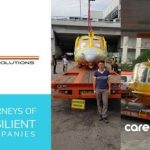“My client was dismayed at being retrenched. It came suddenly, and he had worked at his company for eight years.
“In fact, he had spent a substantial amount of time and money to obtain a Masters’ degree in his career field, and various certifications to allow him to do his job better!”
You’d be surprised how many times career coaches come across jobseekers suffering from the same fate, even in Singapore, where retrenchment numbers are low and job vacancies high.
Some career coaches shared that in an average month, they meet two to three clients who were displaced from their jobs, either voluntarily, or involuntarily, due to retrenchments or a failure to ensure career longevity in their planning.
But at the end of the day, the complacency of expecting our jobs to stay the same week in week out, and our companies to remain as stable workplaces, can creep in for anyone.
It certainly did for this jobseeker that Raphael See, a team leader for the Career Matching Programme at AKG (formerly known as Maximus), spoke about at the beginning of this article. AKG is a career matching provider for Workforce Singapore.
Raphael revealed that the jobseeker was an aircraft maintenance engineer in his mid-40’s and added: “Many who lose their jobs suddenly find themselves unprepared for it.
“Some of the emotions that they have experienced and shared include anger at employers and themselves, fear of losing their means, anxiety for the future and disorientation in their new circumstances.”
There may be reasons to resist career change, but…
The same resistance to change that led to some of these circumstances, can also be a hinderance to moving forward as well.
Often, such jobseekers want to return quickly to their previous circumstances (in job scope, position and salary), and are resistant to consider a mid-career change, Raphael said.
Serene Wong, a Coaching and Development Specialist at Ingeus, a career matching provider for Workforce Singapore added: “When I suggest a mid-career switch to jobseekers, the responses received from them can be mixed.
“Initially, a majority are receptive. Some proceed to apply for such jobs based on their transferable skills but encounter a ‘push-back’ when they do not receive any replies or fail to get shortlisted for interviews. This is where self-doubt about being able to change careers or industries creep in. “
There are also some who feel bitter and resentful, as they feel that their current work experiences are still extremely valuable.
“After a few failed job applications and/or interviews, they start to question why employers do not place enough value their two to three decades worth of contributions and prefer to hire less mature employees.
For other workers in more senior level roles, the loss of ‘face’ and pride can also prevent them from embracing change and building career resilience.
“They avoid reaching out to their career networks, in fear of having to report to someone who used to be their subordinate”, Serene said.
Raphael added: “Ultimately, it is comforting to be able to return or remain with the familiar.
“But taking on a new unfamiliar challenge requires the courage and commitment to see it through.”
There may also be extenuating circumstances for some in their current careers who are loathe for change ahead. They may be committed to certain lifestyles, have loans they currently service or feel pressure to provide education fees for children or financial support for aged parents. They may even have spent time and money pursuing career and educational qualifications, such as ACCAs or MBAs.
However, workers shouldn’t let such circumstances deter them from evaluating their long-term career prospects.
Read More: Career Resilience and Mobility — What They Are, and Why They Matter to All Singaporean Workers
Embracing change can help build career success and resilience
Ultimately, Serene shares that jobseekers and workers who have made efforts to broaden their career horizons and expand both their goals and skillsets, tend to be happy to remain in the jobs and industries they switch to.
“In 2022, I worked with a jobseeker who used to work in the finance division of National Technological University (NTU). She proactively decided to switch industries and move into data management and science.
“She completed a short course in artificial intelligence (AI) at IBM’s training academy, which helped her build some confidence in her career resilience, as the course enabled her to close some career switch knowledge gaps from a technical perspective.
“She then applied her newfound skills in Enterprise Design Thinking, Cloud Computing Architecture, Data Science and AI to help improve everyday processes at the Republic of Singapore Air Force (RSAF), where she was hired on a one-year contract as a data analyst & visualisation officer!
And now that she’s on the path of career resilience, she’s hooked, Serene shared. “She hasn’t stopped learning there and is still continuing to take courses and study while she’s on that job.”















